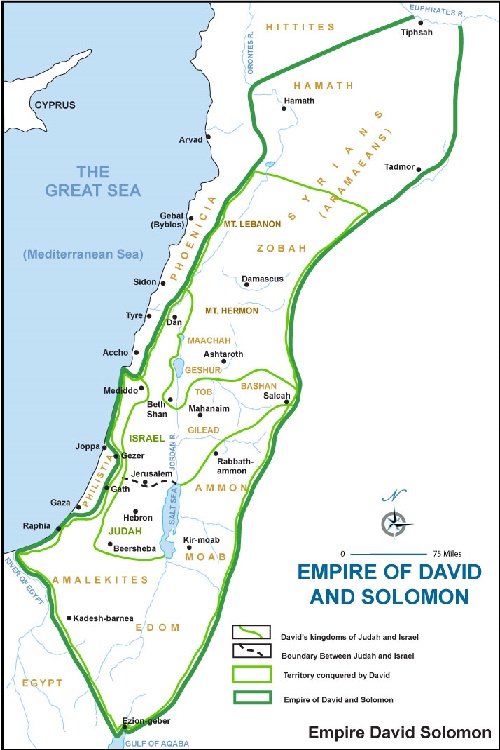Hamathites were listed in Genesis 10:18 and 1 Chronicles 1:16 among the Canaanite nations and inhabited land in Syria, according to the maps at right.
2 Samuel 8:9 mentioned someone named Tou stated as "king of Hamath" during David's battles that was restated in 1 Chronicles 18:2-11:
2. David also defeated the Moabites, and they became subject to him and brought tribute.
3. Moreover, David fought Hadadezer king of Zobah, as far as Hamath, when he went to establish his control along the Euphrates River.
4. David captured a thousand of his chariots, seven thousand charioteers and twenty thousand foot soldiers. He hamstrung all but a hundred of the chariot horses.
5. When the Arameans of Damascus came to help Hadadezer king of Zobah, David struck down twenty-two thousand of them.
6. He put garrisons in the Aramean kingdom of Damascus, and the Arameans became subject to him and brought tribute. The LORD gave David victory everywhere he went.
7. David took the gold shields carried by the officers of Hadadezer and brought them to Jerusalem.
8. From Tebah and Cun, towns that belonged to Hadadezer, David took a great quantity of bronze, which Solomon used to make the bronze Sea, the pillars and various bronze articles.
9. When Tou king of Hamath heard that David had defeated the entire army of Hadadezer king of Zobah,
10. he sent his son Hadoram to King David to greet him and congratulate him on his victory in battle over Hadadezer, who had been at war with Tou. Hadoram brought all kinds of articles of gold and silver and bronze.
11. King David dedicated these articles to the LORD, as he had done with the silver and gold he had taken from all these nations: Edom and Moab, the Ammonites and the Philistines, and Amalek.
2 Chronicles 8:3, 4:
3. Solomon then went to Hamath Zobah and captured it.
4. He also built up Tadmor in the desert and all the store cities he had built in Hamath.
Jeroboam, the successor of the Northern kingdom of Israel, was given credit in 2 Kings 14:28 for taking control of Damascus and Hamath from someone named Yaudi who had no other mentions in the Bible.
When the Assyrians overtook Israel,
2 Kings 17:24 said:
24. The king of Assyria brought people from Babylon, Cuthah, Avva, Hamath and Sepharvaim and settled them in the towns of Samaria to replace the Israelites. They took over Samaria and lived in its towns.
Verse 30 told of a false god called Ashima those people worshipped and in
2 Kings 18:34 and 2 Kings 19:13 Judah's king Hezekiah taunted them that the false god would not help them.
Riblah was reported as a town in the territory of Hamath. As stated in 2 Kings 23:31-33, Jehoahaz, the king of Judah, was captured and placed in chains by (Egypt's) Pharaoh Neco. Later, Babylonians beseiged Jerusalem and took the people of Jerusalem to Riblah where Nebuchadnezzar had them killed in 2 Kings 25:1-21. Again, in Jeremiah, it reiterated how Nebuchadnezzar conquered Judah. Several passages mention Riblah including Jeremiah 39:5 and chapter 52, verses 9, 26-27.
"Lebo Hamath" appeared in numerous passages and often referred to the northern boundary of the Northern kingdom of Israel.
Other occurrences of Hamath:
Isaiah 10:9; 11:11;
36:19; 37:13
Jeremiah 49:23;
52:9, 27
Ezekiel 47:16, 17
Amos 6:2
Zechariah 9:2
Occurrences of "Lebo Hamath":
Numbers 34:8
Joshua 13:5
Judges 3:3
1 Kings 8:65
2 Kings 14:25
1 Chronicles 13:5
2 Chronicles 7:8
Ezekiel 47:15; 48:1
Amos 6:14

